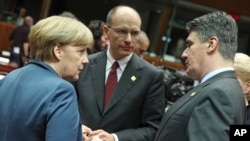PARIS, FRANCE —
As they hold their last summit of the year in Brussels, European Union leaders will be signing off on a key deal aimed to avert future banking crises. But the deal has also sparked disappointment for not being stronger and more far-reaching.
Reached by European Union finance ministers late Wednesday, the agreement will create a single body to police and bailout ailing banks in the 17-nation euro zone.
The deal also foresees a $75 billion fund to cover these costs, with banks, not European taxpayers, paying into it. EU members that are not part of the euro zone have the option of joining the mechanism, which is expected to go into effect in 2015.
European leaders holding their last summit of 2013, hope the deal will shore up confidence in the EU financial system, which has been battered by the eurozone crisis. Failing banks helped force fragile economies like Ireland and Greece to accept costly bailouts.
At a news conference in Brussels hours before the leaders met, EU Commissioner in charge of financial regulation Michel Barnier hailed the agreement as unprecedented.
"We are introducing revolutionary change for Europe's financial sector so that taxpayers no longer foot the bill when banks make mistakes or face crises, ending the era of massive bailouts," said Barnier.
France's Finance Minister Pierre Moscovici told French radio the agreement would protect European taxpayers and bank account holders.
Moscovici said the accord might appear overly technical for many people, but it wa extremely important for European citizens. He called it a big political project that completed the EU monetary union.
But the deal has sparked criticism for being overly cumbersome and not more ambitious. European Central Bank Vice President Vitor Constancio has expressed fears markets might find it too complex. Critics also said the $75 billion fund would not be enough, but Germany, for one, has balked at the idea of using taxpayer money to help bolster it.
Commissioner Barnier acknowledged the deal amounted to a compromise.
But Barnier called it a positive compromise aimed to reflect the views off all the EU members.
The bloc's economic problems have forced many EU leaders to adopt tough austerity measures. They were reminded of just how unpopular the cuts are, as hundreds of protesters blocked traffic in Brussels before the summit.
Reached by European Union finance ministers late Wednesday, the agreement will create a single body to police and bailout ailing banks in the 17-nation euro zone.
The deal also foresees a $75 billion fund to cover these costs, with banks, not European taxpayers, paying into it. EU members that are not part of the euro zone have the option of joining the mechanism, which is expected to go into effect in 2015.
European leaders holding their last summit of 2013, hope the deal will shore up confidence in the EU financial system, which has been battered by the eurozone crisis. Failing banks helped force fragile economies like Ireland and Greece to accept costly bailouts.
At a news conference in Brussels hours before the leaders met, EU Commissioner in charge of financial regulation Michel Barnier hailed the agreement as unprecedented.
"We are introducing revolutionary change for Europe's financial sector so that taxpayers no longer foot the bill when banks make mistakes or face crises, ending the era of massive bailouts," said Barnier.
France's Finance Minister Pierre Moscovici told French radio the agreement would protect European taxpayers and bank account holders.
Moscovici said the accord might appear overly technical for many people, but it wa extremely important for European citizens. He called it a big political project that completed the EU monetary union.
But the deal has sparked criticism for being overly cumbersome and not more ambitious. European Central Bank Vice President Vitor Constancio has expressed fears markets might find it too complex. Critics also said the $75 billion fund would not be enough, but Germany, for one, has balked at the idea of using taxpayer money to help bolster it.
Commissioner Barnier acknowledged the deal amounted to a compromise.
But Barnier called it a positive compromise aimed to reflect the views off all the EU members.
The bloc's economic problems have forced many EU leaders to adopt tough austerity measures. They were reminded of just how unpopular the cuts are, as hundreds of protesters blocked traffic in Brussels before the summit.








